Ready to learn more?
Get all the details straight to your inbox!
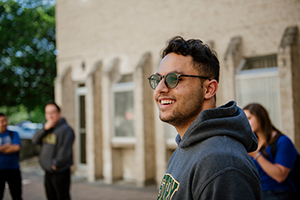
Every degree program at Luther College offers a study abroad option and an optional experiential learning component where you gain real world experience and get paid while going to school!
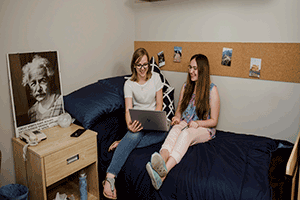
Our student residence, The Student Village at Luther College, welcomes residents from ALL post-secondary institutions in Regina. Rooms come with a meal plan, free laundry, free wi-fi, and a great sense of community.
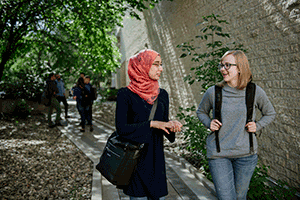
You can book a tour of Luther College, the U of R campus, and our student residence, The Student Village at Luther College, any time throughout the year. Contact our Recruitment Office at 1-306-206-2117.

Luther College students are eligible for nearly $100,000 in academic awards – in addition to scholarships and bursaries awarded by the U of R.

To enrol as a Luther College student, simply fill out the University of Regina application form and select Luther as your campus of choice.

Living in The Student Village at Luther College, our student residence, comes with a choice of healthy, nutritious meal plans. That means no grocery shopping, no meals to cook, and no dirty dishes to worry about. You can focus on your studies and wellness!
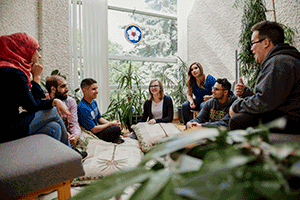
Luther College appeals to students who want to study in a safe, nurturing, and inclusive environment. We welcome students of all faiths, ethnicities, backgrounds, religions, genders, and sexual orientations.
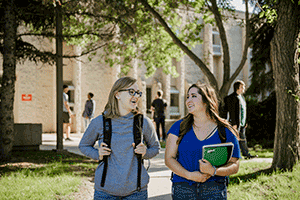
Luther College is a great choice for high school to university transition. Enjoy all the benefits of a larger campus, without feeling lost in the crowd. Our community is full of caring mentors and peers to ensure a positive student experience.
Get all the details straight to your inbox!
By Barbara M. Reul, with Bryan Hillis
When I joined Luther College at the University of Regina as an assistant professor of musicology on 1 July 2003, Dr. Bryan Hillis was still the dean of the College (he was appointed president in 2010). He requested that from now on I attend a Tuesday afternoon “teaching circle” as part of my duties. I had never been to one before I came to Luther College, and it turned out to be my favourite “event” that semester. In fact, I have benefitted tremendously from attending “teaching circles” at LCUR over the years; just ask my students or read my “Story from the Podium” in the Winter 2016 issue of Impetus (or, if you have lots of time on your hands these days, do both).
Wanting to know more about the concept of “teaching circles” in general and about its history at LCUR specifically, I asked Bryan Hillis first to explain the concept of “teaching circles”. He replied:
It revolves around the idea that if teaching is to be effective, it must understand its context and teach to that context. Students change and trends change, and while you can always consult books or experts, knowing the context one is teaching in, is at least as important. So the conversation has to be on topics we are all struggling with or contemplating as instructors in that time and place for them to be interesting. Therefore, the topics originate from the faculty and their concerns, ideas, or thoughts about what they think is working or not working in their teaching.
The idea of a teaching circle is also that it can be fun and very instructive to learn from one another because we know that each of us does things a bit differently. We also know that we are all vitally interested in doing the best we can, and while some of us could be somewhat concerned about being shown up by our peers, doing this in the context of a circle where no one is “the expert”, but where we can all learn from one another and acknowledge the strengths of one another, is a logical extension of the collegiality we already have here at Luther College. Where one teaching circle might play to one faculty member’s strengths (i.e. technology), another faculty member will be an expert the next day on another topic (like evaluation procedures). Sometimes an expert might be brought in to kick-start the conversation, but usually that expert left having learned something from our experiences as those who care deeply about our teaching.
Finally, I think part of the strength of teaching circles is learning from a community you already trust: trust in that you have a supportive network to help you think through problems, and trust in that this is not an evaluative exercise but a formative one where we can all learn from one another. And part of that is just having fun: venting at frustrations with students, telling jokes about student behaviours or how we each had made blunders we could only laugh at. There is also fun in just getting to know one another better. So the teaching circles are as much about building community around a topic that matters so much to all of us as it is about actually learning something which we all care deeply about.
I then asked Bryan who had come up with the idea of making “teaching circles” a fixture on LCUR’s pedagogical landscape. He answered:
No one person came up with this idea, and least of all me. I was involved with the discussion as dean at the time [i.e. in the early 2000s]. But the idea came from our Academic Affairs Committee (AAC) when we were all thinking through different issues. My particular perspective revolved around my experience from teaching what was then called “distance education”. I had learned a great deal about teaching and the use of technology from Myra Zubot-Mitchell, an instructional designer at the University of Regina. Myra had given me a lot to think about as I prepared my “Introduction to World Religions” course (RLST 100) which I had taught many times before. Myra and I were working on the idea that I should not become a “talking head” in a context where I had to stay relatively rooted to the spot for television camera purposes. I found many of the techniques she was having me consider spilled over into the regular classroom classes, and I mentioned this to my colleges at AAC. Some said they thought it might be fun to have Myra talk to others about these techniques. As I remember it, others were also concerned that we had equitable evaluative standards while recognizing that we would never use exactly the same techniques as those in different disciplines. So there was a number of ideas and concerns floating around that we thought we would like to investigate together. I believe it was Dr. Mary Hampton who suggested the idea of a circle, thereby emphasizing the collaborative nature of the discussions we wanted to have. Soon we had the idea of a “teaching circle” established where we were all experts, all willing learners, and we were going to have a social time to talk about teaching which mattered so much to all of us.
As LCUR faculty members we are all heavily engaged in offering a variety of undergraduate classes during the academic year, including at least one per year at the 100-level (see Steven Clow’s article in this issue). But many of us also teach and supervise graduate students on a regular basis. “How do you think teaching at the post-graduate level has changed?” was what I asked Bryan next. He answered:
For me, the single biggest change has been in the way we view graduate students. I remember a time when teaching graduate students was viewed as an imposition, as something that took time and effort and didn’t always line up with our own interests.
While it still may be true that the interests of graduate students don’t completely line up with our own, I am more convinced that we see them as colleagues who can help us in our own research. The goal is always to ensure that graduate students finish their graduate programme, but we recognize now that graduate students can help us with our own thinking and research methods, and we can hopefully even co-publish with those students. As a result, even more of the teaching at the post-graduate level occurs now over the phone, through e-mails or through referencing electronic sources that we both read and discuss together, i.e. not always in person. I think this is a logical extension of the technological means we have available to us.
Still, the personal context of meeting with graduate students is so important as they struggle, like we as faculty, with finding that story-line, determining what more research is necessary and completing the circle of a narrative that will enable the publishing of a master’s or doctoral thesis.
Anyone who knows Bryan will not be surprised about his passionate response to this question, “What do you feel sets teaching at LCUR apart?”:
In general, I think what sets teaching apart at Luther College is that faculty members really do care about their students, what they are learning, and how it will benefit them as they consider their vocation as citizens of the world. While we as professors love our discipline, our areas of research and the curiosity that goes with that, we know full well that students likely won’t remember all or even much of what they have learned from us as simple knowledge. What they will remember is what I call the “fuzzy stuff”. Why did it matter that history has evolved this way, and what does it say to me today? Why does it matter that a certain biological process occurs this way, and what does it matter to sustaining an increasingly fragile environment? Why does it matter how we frame a question as we consider all the perspectives of a debatable question? Our faculty members truly care that students learn those lessons so that they carry that increasingly innate wisdom with them as global citizens.
Specifically, I think that prospective faculty members soon get a sense of how important teaching is and whether they will fit in as faculty at Luther College simply by the performance criteria we have established at LCUR. While there are academic units elsewhere wherein faculty members can get ahead with sloppy, even inadequate teaching so long as their research record shines, at Luther College it is an explicit part of our performance criteria that faculty members must be extremely good teachers, or they will not advance through the ranks. And at Luther College being an extremely good teacher is paired with excellent research because one simply cannot be an extremely good teacher if one’s research is substandard or not cutting edge. I know from having chaired many searches that some candidates’ enthusiasm for working at Luther College is tempered when they see how important teaching is to their advancement as faculty members within our College. So as a matter of self-selection, we get only those faculty who truly care about their students and how their particular discipline will impact those students. That’s specifically why we have such great teachers here – it’s part of their vocation as faculty members and at least partly why they chose Luther College.
Finally, I gave Bryan the opportunity to share with our Impetus readers anything else he considered important in this context. He replied:
As someone who has not been able to teach these past six years [Editor’s note: due to his appointment as president in 2010], I envy faculty members who have this opportunity. I know only too well that teaching can be a grind; the deadline of those lectures and marking that must be done for students who often don’t appreciate our efforts can be discouraging and appear to be simply a whole lot of work. But, as much as I love my job and would like to think that even in my position as an administrator I may be having some good effect in setting the context for good teaching – it is the teachers who inspire students, who will be remembered by their students and who, as hokey as it may sound, truly are changing the world through their students. When I talk to alumni, I always hear from them how our professors have changed their lives, given them so much to think about, and prepared them for the amazing contributions they are making to the world. I truly wish I could take faculty members with me on these alumni visits so they could hear from and be encouraged by the students, now successful in whatever endeavour, who are so grateful for the teaching vocation our faculty members have demonstrated. It might not only make marking those papers a little less of a grind, but would certainly also help faculty realize that their efforts are appreciated greatly by our students
And there you have it. Many thanks to Bryan Hillis for taking the time to provide such detailed answers.
I look forward to many more “teaching circles” at LCUR, especially since we have just opened them up to our colleagues from Campion College at the University of Regina this semester; in turn, we get to go to their “version” of our “teaching circle” on Friday afternoons.
Finally, if you have been silently wondering whether we also discuss issues related to our research at LCUR, the answer is “of course”. Rest assured that due to our diverse areas of expertise (we have faculty members teach courses that are attached to degree programmes offered in three different faculties at the University of Regina, i.e. Arts, MAP, and Science), it’s never dull!